TechRadar Verdict
While Shopify provides an accessible means of constructing and managing your web store, it's worth considering alternative platforms that offer a wider range of features and functionalities. Also, managing product listings and other backend tasks may require navigating through a separate dashboard, but the overall process is user-friendly, albeit a bit awkward at times.
Pros
- +
A whole variety of payment options
- +
Built-in email marketing and SEO tools
- +
Extensive third-party integrations (over 8,000 apps)
- +
Multi-platform selling
- +
Superb choice for all store sizes
- +
User-friendly interface
- +
Robust, round-the-clock customer support
Cons
- -
Not many free themes
- -
Few built-in features
- -
High transaction fees (without Shopify Payments)
Why you can trust TechRadar
In our Shopify review, we’ll dive deep into one of the best website builders and most popular e-commerce platforms on the market.
So, if you're thinking about using Shopify for your online store, you're in the right place. It's an all-in-one platform crafted to assist users in efficiently creating and managing their online stores, even if they have no coding or design background.
As trusted experts in website builders and the best ecommerce platforms, we've rigorously tested Shopify's features, performance, and user-friendliness to offer you reliable insights and recommendations. Whether you're a small business owner, international seller, or new to e-commerce, our Shopify review is here to guide you towards making an informed decision.
We'll delve into everything from Shopify's sales features to its ease of use, pricing, design options, and marketing tools. You'll discover Shopify's strengths, like its integrated tools for customer communication and sales optimization, as well as any potential drawbacks, such as transaction fees and feature limitations.
So, let's explore what Shopify brings to the table and determine if it's the perfect fit for your online store dreams.
Shopify stores: Selling online
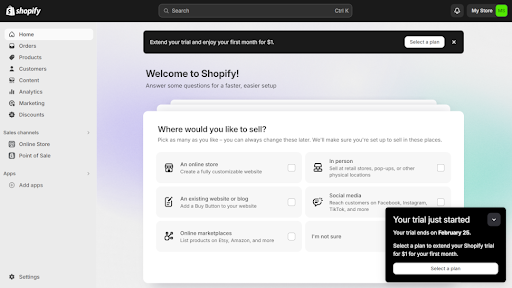
You’ve decided to take the plunge into the world of e-commerce and you're considering Shopify as your platform of choice, right? Let’s go through the process of creating your online store and explore the suite of e-commerce features that Shopify has to offer.
Right from the start, we’ve appreciated how Shopify simplifies the process of setting up an online store. With its intuitive interface and beginner-friendly website design tools, getting started is a breeze. Once you’ve selected one of over 160 professional-looking themes, you can easily customize your site to your liking with Shopify's drag-and-drop editor.
Next, it's time to add your products or services. Shopify makes this process super simple, allowing you to upload product images, set prices, and write compelling descriptions with ease. We found Shopify Magic particularly helpful here as this AI tool generates product descriptions for you, saving you time and energy.
As keeping track of inventory becomes crucial, Shopify offers robust inventory management tools to help you stay organized. We like the ability to assign inventory to multiple locations, including retail stores and warehouses, and track inventory levels for product variants.
Arranging shipping for your products is made simple with Shopify's shipping solutions. It’s easy to set up shipping options, whether you're offering flat-rate, free, or calculated shipping. Plus, Shopify integrates seamlessly with popular shipping apps and carriers, ensuring competitive shipping rates.
Another essential for converting visitors into customers is a seamless checkout experience and Shopify delivers with its customizable checkout process. You can personalize the checkout cart with your brand colors and fonts, creating a more consistent shopping experience for your customers.
Thinking about embracing a point-of-sale (POS) system? Shopify's POS app can turn any mobile device into a sales tool, allowing us to accept payments, issue refunds, and manage inventory on the go. Whether at a pop-up event or a retail store, Shopify POS keeps the sales and inventory synced across all channels.
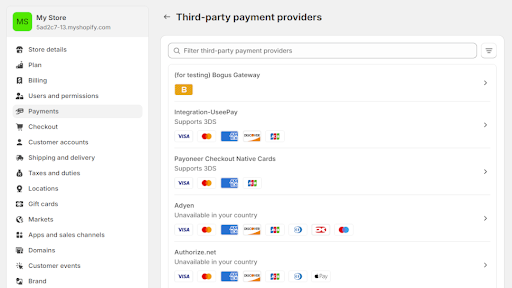
To simplify the online payment process you can utilize Shopify Payments, Shopify's own payment service. Plus, by using Shopify Payments, you can avoid transaction fees and support multiple currencies, providing a hassle-free checkout experience for your customers. You can even use multiple currencies/markets with one storefront, making selling internationally both easy and tailored to your audience.
All in all, Shopify equips online sellers with everything they need to succeed in the competitive e-commerce landscape. Now, let’s take a look at other important Shopify features and tools.
Other Shopify features and tools
As you probably suspect by now, when you start your online store journey with Shopify, you're not just getting a simple website builder. Instead, you're tapping into a toolbox filled with powerful features and tools that can make running your e-commerce store smoother and supercharge your online presence.
Shopify themes
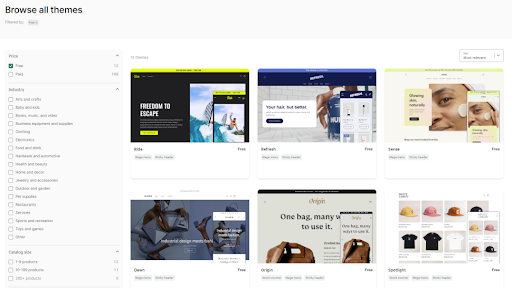
Shopify offers a rich collection of themes tailored to enhance your brand's identity and engage your audience. Whether you choose one of the 12 free themes or invest in one of over 160 premium options, which range in price from $140 to $400 each, you're bound to find one that aligns with your vision. What's more, if you don't find exactly what you're looking for, each Shopify theme is customizable, allowing you to tweak everything from colors and fonts to layout and buttons.
Furthermore, Shopify themes aren't just visually appealing - they're also highly functional. Each theme is designed to be mobile-responsive, ensuring that your store looks and performs flawlessly on any device, whether it's a smartphone, tablet, or desktop.
However, it's important to note that while Shopify offers a wide variety of themes, the selection tends to favor premium options. While there are free themes available that can certainly kickstart your e-commerce journey, the choices are somewhat limited compared to the paid options.
Shopify website editor
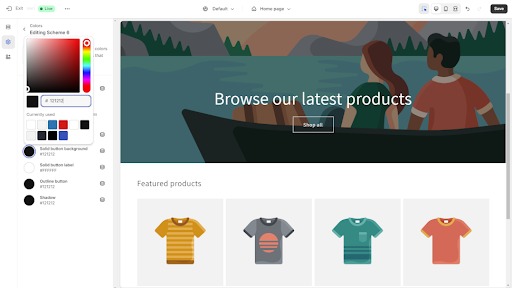
Crafting your store's design is simplified with Shopify's intuitive drag-and-drop website editor. Whether you're adjusting images, editing text, or featuring your logo, the editing interface provides the flexibility and control you need to create a captivating storefront. The drag-and-drop functionality makes it easy to rearrange elements on your site, allowing for swift and seamless customization. You can also do AI image editing on the fly in admin and via the mobile app.
In terms of ease of use, Shopify website builder is generally straightforward and accessible to users of all experience levels. The drag-and-drop interface eliminates the need for coding or technical know-how, making it easy for beginners to build professional-looking websites.
However, some users may find navigating through the separate dashboard for managing product listings and other backend tasks slightly awkward, specifically when transitioning between different aspects of store management.
Despite any minor awkwardness, the Shopify website editor offers a range of helpful and useful features to enhance your online store.
Domains
When you start your Shopify store, you automatically get a Shopify-branded domain like “yourstorename.myshopify.com”. It's functional, but if you want to step up your game and look like a pro, you'll probably want a custom domain. Also, Shopify charges $15 per year for the domain, which is pretty pocket-friendly. Likewise, domains with extensions like “.store” or “.shop” are also affordable compared to competitors.
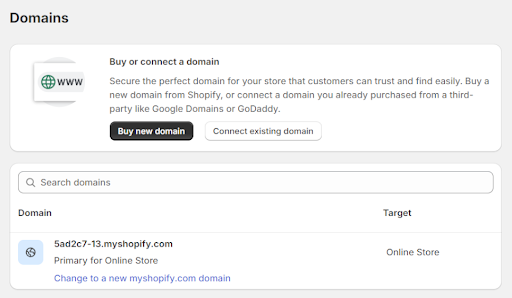
Getting a custom domain for Shopify stores is straightforward. You can purchase one straight from the Shopify platform by going to your dashboard, navigating to settings, selecting domains, and choosing to buy a new domain. Once you've got your domain, you'll just need to connect it to your Shopify store.
With a custom domain, you'll boost your brand more easily and build trust with your customers.
AI tools: Shopify Magic and Sidekick
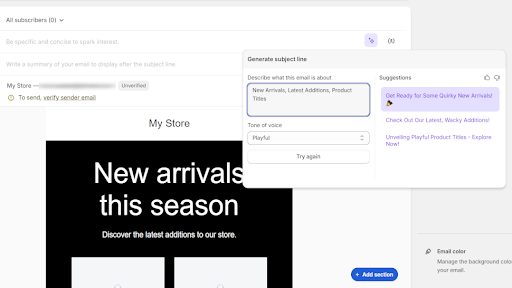
Expanding on Shopify's latest AI innovations, let's dive into the world of Shopify Magic and Sidekick. These AI-powered tools are designed to revolutionize the way you manage your store and engage with your customers.
First up, Shopify Magic. This AI-powered tool takes the headache out of crafting compelling product descriptions. By simply inputting a few product details, Shopify Magic works its magic to generate captivating descriptions, saving you time and effort in content creation.
Now, you can think of Sidekick as your AI assistant, ready to support you with a wide range of tasks, helping you streamline your business operations. From setting up discounts and promotions to creating insightful reports, Sidekick is there to lend a helping hand. Want to analyze sales data to identify trends and opportunities? Sidekick has you covered.
Shopify Magic and Sidekick are designed to streamline tasks, potentially saving you precious time while helping you make smart decisions to fuel business growth. However, it's worth noting that, like any technology, these tools may not be perfect right off the bat and will need some tweaking along the way.
Shopify app store
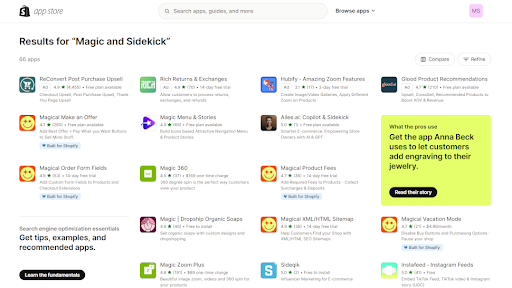
The Shopify App Store provides a vast collection of apps and third-party extensions to enhance your store's capabilities. With over 8,000 apps available, you'll surely find solutions for every aspect of your e-commerce business, from marketing and promotion to inventory management and customer support.
The strength of the Shopify App Store lies in its diversity. Whether you're looking to streamline your checkout process, implement loyalty programs, or integrate with popular marketing platforms, there's an app to fit your needs.
Exploring the app store, we found a treasure trove of checkout apps, each offering unique ways to elevate your store's checkout experience. With almost 30 options available, we were thrilled to discover features such as upsell and cross-sell suggestions, age verification tools, and post-purchase surveys.
We were also impressed by Shopify's seamless integration with popular marketing apps like Mailchimp and Klaviyo, offering a robust set of tools to boost your marketing efforts. From crafting compelling email campaigns to running targeted social media ads and analyzing customer insights, these apps can aid in engaging with your audience effectively.
However, while many apps in the Shopify App Store come with no upfront costs, as we delved deeper into the ecosystem, we found that the cumulative costs of paid features can accumulate swiftly.
Website security
When it comes to keeping your online store safe and secure, Shopify has you covered. All Shopify plans come with SSL security, which encrypts data passing between your customer and your website. This is crucial for protecting sensitive information, such as payment details, from hackers.
Another important aspect of security is PCI compliance, and Shopify is Level 1 PCI DDS compliant. This might sound like a mouthful of legal jargon, but it essentially means that your store meets the necessary security standards for processing credit and debit card details.
One of the advantages of using a hosted solution like Shopify is that keeping your site secure is largely Shopify's responsibility, not yours. Unlike self-hosted platforms where you have to manage core software and plugin updates yourself, Shopify takes care of these updates in the background. This means you can be at ease knowing that your site is always up-to-date with the latest security patches.
What's more, Shopify has a strong fraud detection system in place to prevent card testing and account takeover fraud. They also use an alert system to notify customers and account managers of potential security threats, allowing you to take prompt action to secure your accounts.
Shopify pricing: Is Shopify good value for money?
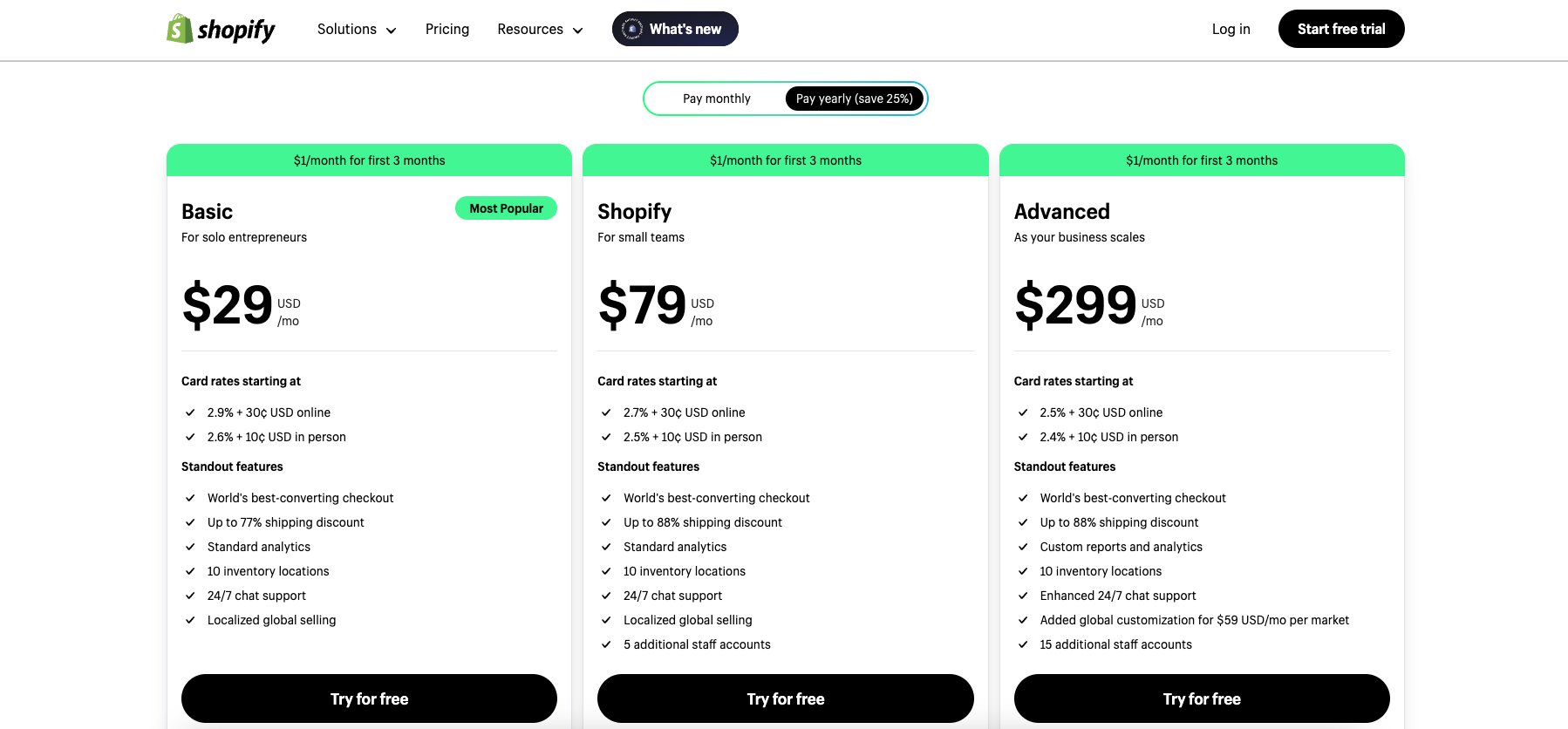
When it comes to Shopify pricing, you might be wondering if there's a free option or at least a trial period to test things out. Well, while Shopify doesn't offer a forever-free plan, they do give you a 3-day free trial to get a feel for the platform before committing.
As for Shopify plans, there are three main ones: “Basic”, “Shopify”, and “Advanced”, where each plan has its own set of features and price points, catering to different needs and budgets.
Starting with the “Basic” plan at $29 per month (billed yearly), it's great for those just setting up their first online store. Despite the name, it gives you everything you need to get up and running smoothly, like unlimited products and basic reporting.
If you're ready to take things up a notch, the “Shopify” plan at $79 per month (billed yearly) might be more your speed. It offers lower transaction fees, better reporting tools, and more staff accounts, making it one of the best small business website builder plans and great for international sellers looking to spring up.
Now, if you're running a bigger operation with an established customer base, the “Advanced” plan at $299 (billed yearly) per month could be the way to go. It comes with all the features of the Shopify plan, plus some extras like custom reporting and more staff accounts.
| Header Cell - Column 0 | Basic | Shopify | Advanced |
|---|---|---|---|
| /mo (paid annually) | $29 | $79 | $229 |
| /mo (paid monthly) | $39 | $105 | $399 |
| Transaction fees (online payments) | 2.9% + $0.30 | 2.7% + $0.30 | 2.5% + $0.30 |
Moreover, Shopify offers four additional specialized plans tailored to suit specific types of businesses:
The "Starter" plan at just $5 per month (billed yearly) is perfect for sellers who have already established their audience on social media platforms or messaging apps. With this plan, you can instantly start selling through these channels or set up a small online store hassle-free.
Next up, we have the "Retail" plan priced at $89 per month (billed yearly), specially crafted for businesses focusing on in-person selling. This plan comes packed with advanced staff, inventory, and loyalty features, making it the go-to choice for businesses with physical storefronts.
Looking for exceptional value and growth opportunities? "Shopify Plus" starts at $2300 per month (billed yearly) and is tailored for high-growth businesses. Offering advanced features and personalized support, Shopify Plus is your key to efficiently scaling your business to new heights.
Lastly, "Enterprise commerce" offers custom pricing plans designed to meet the unique needs of large-scale operations. With a focus on agility, deployment speed, and performance, this plan ensures seamless support for your enterprise-level business.
Sure, Shopify's pricing might seem a bit steep compared to some other options out there, but when you consider all the features and support you're getting, it's worth it. Plus, they offer additional add-ons for in-person sales and high-volume stores with specialized needs. And if you want more detailed info on Shopify's pricing and plans, you can check out their pricing page.
Shopify help and support
With Shopify, you'll find a solid range of support options. Whether you're a beginner or an experienced e-commerce entrepreneur, Shopify offers comprehensive support channels to ensure you have the help you need when you need it.
One of the main selling points of Shopify's support system is its round-the-clock availability. Regardless of the time zone you're in, you can access support 24/7 through various channels, including phone support, live chat, social media, and email. This means you'll get much-needed assistance promptly, even during weekends or late at night when you're burning the midnight oil to work on your store.
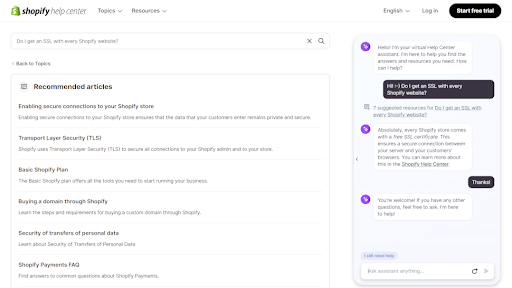
At the Shopify Help Center, you'll find an abundance of information from step-by-step guides to troubleshooting articles - a wide range of topics to address common questions and concerns. However, some users may find the step-by-step instructions a bit confusing, especially when directed to the app store without further guidance.
For those seeking more personalized assistance, Shopify offers advanced specialist support, particularly beneficial for “Shopify Plus” users. With this level of support, you'll have your own dedicated support agent who will help you address any specific needs and challenges.
It's worth noting that Shopify's customer support extends across multiple languages, ensuring accessibility for users worldwide, although the availability of support in other languages may vary depending on your location.
Shopify's support services are pretty good, but it can sometimes be a bit of a hassle to get in touch with their support team. You often have to search through their help pages to find a solution to your problem before you can even access their contact details. While this approach is common, it can be a bit annoying for those who need help right away.
Shopify: What’s not included? What could be better?
While Shopify is a superb choice for setting up online stores, there are a few areas where it could be even better.
For starters, Shopify relies quite a bit on third-party apps to add extra features. Unlike some other platforms like Wix, which come with more built-in tools, you might find yourself adding several apps to match your store's needs. While this gives you flexibility, it can also mean more costs since many apps come with a price tag.
Another thing to consider is Shopify's transaction fees. Unless you use Shopify Payments, which they prefer, you'll end up paying extra on top of your regular payment gateway fees. This can eat into your profits, particularly if you're just starting out. So, while Shopify plans might seem affordable at first, don't forget about those extra expenses. Transaction fees and the cost of third-party apps can add up swiftly, making Shopify potentially pricier than you bargained for.
Plus, there aren't as many free themes on Shopify compared to the paid ones. It'd be nice to see more free options, especially if you're on a budget or just starting your ecommerce journey.
When you look at Shopify compared to Squarespace and Wix, each has its pros and cons. Squarespace has sleek designs, Wix offers a free plan and lots of templates, but Shopify shines with its e-commerce focus and tons of integrations.
If you are looking to build an ecommerce site easily, Shopify is certainly one of the best options. However, if you run a large or complex online store, it can be worth checking out the likes of BigCommerce, Woocommerce, and Magento as each has its own benefits for larger businesses.
You can check out our Magento vs Woocommerce vs BigCommerce vs Shopify comparison here.
So, while Shopify is a top choice for many, there's still room for improvement, especially in making things more affordable and less dependent on extra apps.
Shopify review: Final thoughts
As we wrap up our Shopify review, this all-in-one solution emerges as one of the best website builders for agencies and entrepreneurs venturing into the e-commerce realm. Throughout our journey, we've come to appreciate Shopify's dedication to customer support, ensuring that a helping hand is always just a click away. We've also found the platform's commitment to website security reassuring, with features like SSL encryption and PCI compliance providing peace of mind for both businesses and their customers.
However, we must mention a few areas where Shopify could improve. While it offers a wealth of features, we found that relying on third-party apps for certain functionalities can lead to higher costs. Additionally, transaction fees may eat into your profits, especially if you opt for non-Shopify payment gateways. Despite these drawbacks, we believe that Shopify's benefits far outweigh its limitations.
To recap, our experience with Shopify has been overpoweringly positive. We were impressed by its user-friendly interface, extensive theme collection, and the wide array of apps available to boost store functionality. If you're considering Shopify for your e-commerce venture, we encourage you to take advantage of the free trial to explore its features firsthand. Once you've had a chance to delve deeper into Shopify's offerings, you can choose the plan that best suits your business needs and budget.
Shopify review: FAQs
Is Shopify good for agencies?
Yes, Shopify is one of the best website builders for agencies. Its robust e-commerce platform offers a wide range of features and customization options, making it suitable for building and managing online stores for clients. Additionally, Shopify's partner program provides agencies with resources and tools to streamline client management and boost their businesses.
Is Shopify best for building online stores?
We've found Shopify to be one of the top choices for creating online stores.
It's easy-to-navigate interface, wide selection of apps, and robust e-commerce capabilities make it a go-to platform for anyone looking to start or grow their online business. Whether you're just kicking off your small business, pushing forward as an entrepreneur, or running a large enterprise, Shopify delivers the kind of scalability and flexibility you’ll want to thrive online.
What can you sell on Shopify?
Shopify supports the sale of a wide variety of products and services, ranging from physical goods like clothing, electronics, and home decor to digital products such as ebooks, software, and online courses. In addition to this, Shopify allows merchants to sell services, subscriptions, memberships, and even event tickets. With its all-purpose platform and integrated payment solutions, Shopify provides the tools and resources you’ll need to sell virtually anything online.
Mirza Bahic is a freelance tech journalist and blogger from Sarajevo, Bosnia and Herzegovina. For the past four years, Mirza has been ghostwriting for a number of tech start-ups from various industries, including cloud, retail and B2B technology.
- Owain WilliamsB2B Editor, Website Builders & CRM
